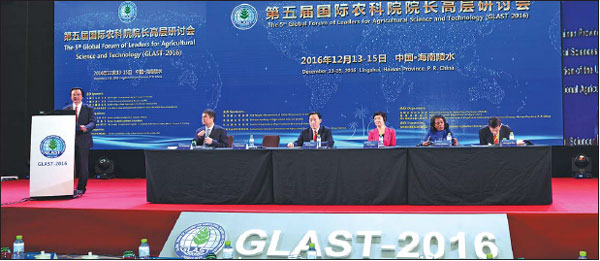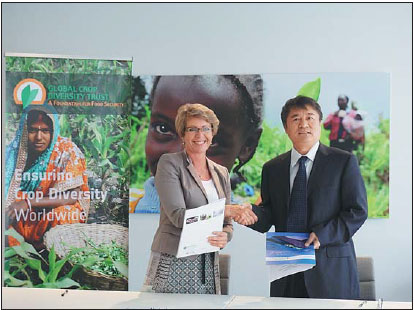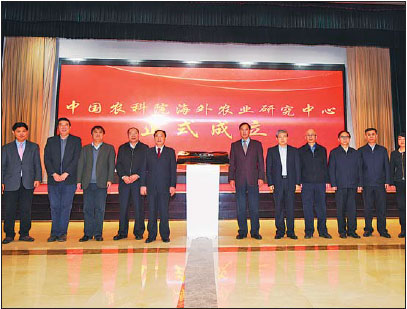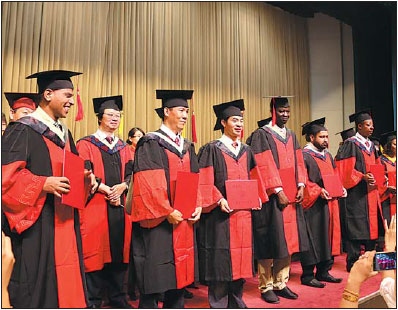Celebrating 60 Years Of Success
Through decades of groundbreaking research and innovation, CAAS has been central to improving food supply, security and safety worldwide
China's top agricultural scientific institution, The Chinese Academy of Agricultural Sciences will continue to work on scientific innovation and technology transfer to better serve the strategic planning of the country, said Tang Huajun, president of the academy.
"Food lays the foundation of everything from economic development to social security," he said.
"Though CAAS has been through ups and downs in the past 60 years - even dissolved in 1971 - what didn't change is its responsibility to help guarantee the food security and safety for Chinese people."
More than 10,000 new varieties, products and techniques, including genetically improved insect-resistant cotton, dwarf-sterile wheat, rapeseed with a higher oil content and the mechanized harvest of peanuts, won 310 national-level awards, accounting for 16.2 percent of the whole number of the awards in the field of agricultural research, ranking the first in China's agricultural industry, statistics showed.
It is ready to celebrate its 60th anniversary on May 26.
In 2006, it developed Zhongdan 808 corn variety, which can increase yields up for about 19.7 percent with its big and full heads and was widely used in southwestern regions of China for more than 10 years, according to Huang Changling, researcher of the corn project.
The cultivating area of super rice totaled 72.6 million hectares as of the end of 2015, with yields growing by 60 billion kilograms from 2006, according to the 20th anniversary of super rice's creation held in East China's Zhejiang province in November 2016.
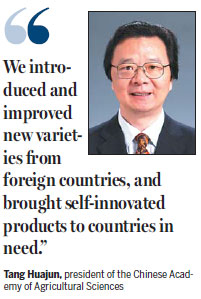
CAAS also determined to serve industrial development by extending its scientific achievements in agriculture both domestically and internationally, Tang said.
More than 10 original agricultural products and technologies, including hybrid rice and corn varieties, foot-and-mouth disease vaccines and biogas technology, have gone global to 28 countries.
"Green Super Rice" (GSR) cultivars that were developed by CAAS have been planted in 17 Asian and African counties, with a total cultivated area of 2.1 million hectares, funded by the Bill & Melinda Gates Foundation. So far, GSR has contributed to increasing farmers' incomes by $564 million a year according to data from the project.
CAAS has established cooperation in agricultural research with 80 countries, 38 international organizations and seven multinational companies by now, with co-established laboratories and research centers totaling 62 as of 2016.
"We introduced and improved new varieties from foreign countries, and brought self-innovated products to countries in need," Tang said.
The insect-resistant cotton, exported to countries such as Kazakhstan, Pakistan and Kyrgyzstan, who faced limitations in available varieties and planting skills, helped improve production by 33.3 percent, he said.
The project also applied new technologies, increased the income of local farmers and turned the import mode into one of self-production, he added.
Though China had some breakthroughs in the crop varieties breeding and disease control, its development of large animal breeding was still 50 to 60 years behind developed countries, he said.

"It takes about 30 to 50 years to cultivate a new variety of large animal, which causes difficulty for the consistency of research," he said.
The intelligence and efficiency of agricultural implements is also less developed, he said.
The progress of agricultural science and technology has included basic theory, usage of light, the upgrading of crop varieties in an average every three to five years, improving production by 10 to 20 percent and becoming more adaptive to severe landscapes such as saline-alkali soil, the improvement of planting and breeding skills, Tang said.
As for large-scale extension of scientific achievements, he said the government gave allowances to quicken the pace of acceptance among the public.
The avian influenza vaccine developed by researcher Chen Hualan at CAAS, after approval, was sent to chicken farms to guarantee poultry egg production as well as farmers' income.
Harbin Weike Biotechnology Development Co, founded in 1992, is a State-owned enterprise subordinated to the Harbin Veterinary Research Institute of CAAS to industrialize scientific research in the epidemic treatment of animals, including the production of the avian influenza virus.
Tang said CAAS also believed in the spirit of hard work and plain living.
"Agricultural research is a down-to-earth labor," he said. "Sometimes you have to walk into the fields and get your new shoes muddy. Sometimes you have to work under the glaring sun. Sometimes it takes more than 10 years to get the results of your research."
Zhuang Qiaosheng, a researcher of the academy with 60 years of experience in wheat genetics and breeding, at 101 years old still walked into the experimental fields to see if the crops grew well, Tang said.
Zhuang developed Beijing 8, 10 and Fengkang wheat varieties whose drought, coldness and barren resistance property can adapt to the landscape and climate of northern China.
"If an old scientist loves this work that much, I will be ashamed and regretful if I cannot do as much as he did," Tang said.
Tang got his doctorate degree from Ghent University of Belgium in 1991, focusing on agricultural land resources and agricultural economies.
He returned in 1993 to work in CAAS and was appointed the president of CAAS last December. "My father is a farmer. Having enough food to eat healthily is always my concern," he said.
"Though there were chances for me to change careers, I chose to stay because I believe agriculture is of great value."
The number of staff reached 7,066, more than 50 percent staff with postgraduate degrees. Students totaled 4,515.
"I want to tell the young researchers to have faith in their work, and stick to it during hard times. And that innovation is always important," he said.
He said CAAS was working on a flexible evaluation mode for its teachers and students to provide a looser scientific environment in the campus.
"CAAS is determined to build a world-class agricultural scientific institutition, to put emphasis on scientific breakthroughs and their application in real life, and to attract and cultivate more professionals for society," said Tang.
|
Tang Huajun (left), president of the Chinese Academy of Agricultural Sciences, attends the fifth Global Forum of Leaders for Agricultural Science and Technology in Lingshui, Hainan province.Photos Provided To China Daily |
|
The Chinese Academy of Agricultural Sciences establishes a partnership with Global Crop Diversity Trust in 2014. |
|
Representatives from the Chinese Academy of Agricultural Sciences attend the opening ceremony of CAAS' Overseas Agriculture Research Center. |
|
Overseas students attend the launching ceremony of the Center for International Agricultural Research at the Chinese Academy of Agricultural Sciences. |

(China Daily 05/26/2017 page6)


